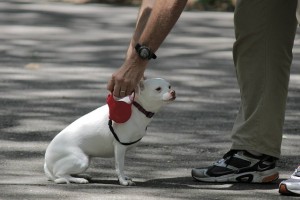Why Your Puppy Doesn’t Want to Walk
In handling or training your puppy it is better to view him or her as you would a human toddler and try using some of the methods that would work for a child in dealing with whatever issues may arise. The basic difference is that dogs do not communicate on the same level as we do, you therefore would also need to have an idea about basic canine communication and how these adorable creatures relate with one another.
3 Important Considerations
If your puppy doesn’t want to walk, you needn’t become overly concerned or worried. Stay calm and consider that all you may require is a little adjustment in your approach and perspective. Let’s consider 3 important things necessary for achieving results in puppy training.
- Your puppy is intelligent but not as much as you are: as dog owners, we sometimes tend to forget that although our canine family members are quite intelligent, they are not as intelligent as we are and therefore still look to us for leadership and direction- just like toddlers.
- You are a puppy parent but not a dog: Ordinarily, without human influence, a puppy would get all the training it needs from and older dog and through interaction with other members of the pack in the ‘family’ way.
- Patience is key: Results may not come overnight; you must be ready to stay positive, assertive and reinforce positive behavior.
Once these 3 considerations are in place, it then becomes pretty easy to not only encourage your puppy to walk, but to also give all the needed training that is required.
Why Your Puppy May Not Want To Walk
Health problems: First, check with your vet to be sure that your puppy is physically okay. Ruling out a health problem can put your mind at ease so that you can focus on dealing with the issue.
Fear: Your puppy may loathe leaving your apartment for a walk because he or she is afraid and this is understandable. Your pet is just starting to make sense of the world and busy sidewalks or a strange environment may cause fear and an unwillingness to venture out.
To deal with this, you may enlist the help of an older dog in motivating your puppy to believe that walking can be fun. You may also try walking as a group with other dog owners to encourage your puppy. In time, your puppy will most likely become comfortable with the idea.
The leash: Your puppy might resist wearing a leash. You may hold off using the leash if your puppy is less than 14 weeks old. When introducing a leash to your puppy train him or her to associate it with playtime. On walks, use the leash only as a guide and not just to restrain movement.
Get Help: You can take the stress off you by enlisting the assistance of a professional dog walker like Saint Louis Dog Walkers
Reward Every Effort
Each time your puppy ventures out for a walk, let him or her know you are happy by offering treats and a pat on the head.


